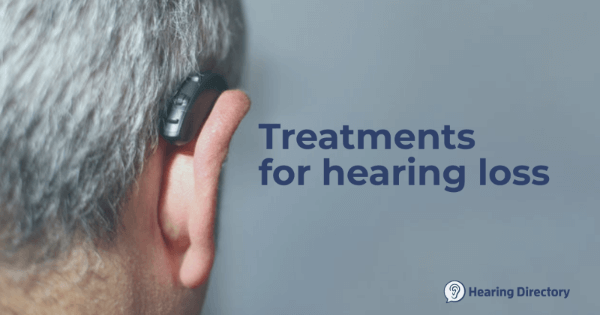|
www.HearingDirectory.ca |
Hearing loss treatment options
By Cara Jelinek, Aud (C), Reg. CASLPO, Audiologist and Clinic Manager, and Shantelle Shakes, BA (Hons)., Hearing Health Information Coordinator, Hearing Directory Last updated on: July 4th, 2025 Take our hearing loss treatment quiz and see which one may be right for you. Which hearing loss treatment is right for you? Take the quiz!
Key points:
Once a hearing professional has diagnosed you with hearing loss, it is time to explore your options. Your hearing professional can recommend the best treatment for you. Your type of hearing loss, budget and lifestyle may ultimately influence your decision. Here are the hearing loss treatment options available and who they are best suited for.
Treatment for sensorineural hearing lossOne of the most common types of hearing loss is sensorineural hearing loss. This means there is damage or deterioration of the inner ear (cochlea) and/or the auditory nerve. This usually happens from exposure to noise and/or aging. The inner ear and auditory nerve cannot repair themselves, making sensorineural hearing loss irreversible. As a result, it is often treated with hearing aids. Medication or surgery cannot treat this type of hearing loss. Hearing aidsHearing aids are a remarkable option for many people. They enhance your soundscape for a more natural listening experience. Hearing aids do not restore your hearing, but increase the volume of sounds you are not hearing. They include custom settings for different listening environments. They also come in many types, colours and styles. Cochlear implantsIn profound hearing loss cases, cochlear implants are also a treatment option. Cochlear implants are surgically implanted devices. They stimulate the auditory nerve, bypassing the damaged inner ear. This allows you to perceive sound you otherwise would not hear. Your hearing professional may recommend cochlear implants if you are getting little or no benefit from wearing hearing aids. Treatment for conductive hearing lossConductive hearing loss is usually temporary. It occurs when an obstruction blocks sound from entering the inner ear. This can be due to
Treatment often includes earwax removal, antibiotics or surgical procedures. In rare cases, abnormalities of the outer or middle ear can cause conductive hearing loss. This includes ear canal stenosis (narrow ear canal) or exostosis (surfer’s ear). These conditions can be difficult to treat. Your hearing professional may also recommend hearing aids or a bone-anchored hearing aid (BAHA). BAHAs are surgically implanted devices. They send sound vibrations to the inner ear through the skull bone. BAHAs are ideal for those with single-sided deafness. They are also ideal if you have malformations of the outer or middle ear. Treating hearing loss with assistive listening devicesIn some cases, hearing aids alone cannot address specific listening situations. Assistive listening devices can help you hear better while
Your hearing care provider is an expert in this area and can provide guidance. Hearing aid accessories and featuresThere are many features and accessories to help you get the most out of your hearing aids. These include
A remote control can allow for easy volume and programming with the push of a button. It is small enough to carry in your pocket or handbag. These options can make using your hearing aids easier and more enjoyable. What is the impact of untreated hearing loss?
best treatment for your hearing loss. Untreated hearing loss makes it difficult for you to follow conversations. It is often exhausting, and can trigger relationship problems. Untreated hearing loss may lead to reduced contact with family, friends and colleagues. This may lead to feelings of isolation and depression. Hearing loss may also affect your sense of safety. It may make you feel less stable, increasing your risk of falls. Hearing aid benefitsThere are many evidence-backed benefits to treating your hearing loss, with hearing aids or other devices. Hearing loss treatment may:
Bottom line: Hearing is central to your health and quality of life. If you are not enjoying the activities you used to and struggle to follow conversations, it is time to seek support. Furthermore, prevention strategies can help protect the residual hearing you still left. Cara Jelinek, Audiologist and Clinic ManagerContributing author Cara Jelinek graduated with a master’s degree in audiology from the University of Western Ontario in 2003. She has over 15 years of clinical experience assessing and treating both adult and pediatric populations as well as actively participating in and leading community outreach, teaching and clinical management. Cara finds the variety and pace fulfilling and enjoys working with the public. She is also an active volunteer and coach in her local community. Shantelle Shakes, BA (Hons)., Hearing Health Information Coordinator, Hearing Directory
You are reading about: Related topics
More information about hearing aids. Featured clinics near me
Schedule a hearing test with Healthy Hearing. Find a clinicThe Healthy Hearing Report |
|
www.HearingDirectory.ca |
Hearing loss treatment options
By Cara Jelinek, Aud (C), Reg. CASLPO, Audiologist and Clinic Manager, and Shantelle Shakes, BA (Hons)., Hearing Health Information Coordinator, Hearing Directory Last updated on: July 4th, 2025 Take our hearing loss treatment quiz and see which one may be right for you. |
 Are you located in the United States?
Are you located in the United States?



 Shantelle Shakes is the hearing health information coordinator for Hearing Directory. She has over ten years of experience in the health industry, with nine of those years in hearing healthcare. After graduating from York University with an honours BA in professional writing, minor in creative writing, Shantelle began her marketing career with a major hearing healthcare provider. Through a variety of roles within that company, Shantelle gained a thorough understanding of hearing health and the client experience. She aims to use her knowledge of the industry as well as her communications background to help others understand their hearing and connect with the hearing care they need.
Shantelle Shakes is the hearing health information coordinator for Hearing Directory. She has over ten years of experience in the health industry, with nine of those years in hearing healthcare. After graduating from York University with an honours BA in professional writing, minor in creative writing, Shantelle began her marketing career with a major hearing healthcare provider. Through a variety of roles within that company, Shantelle gained a thorough understanding of hearing health and the client experience. She aims to use her knowledge of the industry as well as her communications background to help others understand their hearing and connect with the hearing care they need.